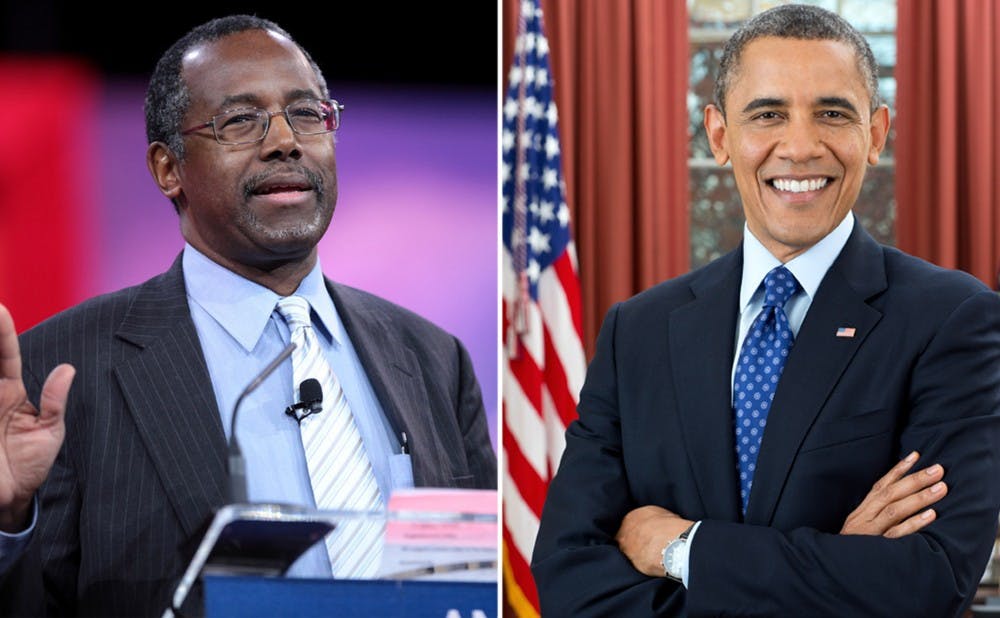Political diversity on college campuses has come under fire recently—from both GOP presidential hopeful Dr. Ben Carson as well as President Barack Obama.
In June, Carson suggested that the federal government ought to defund colleges that demonstrate “extreme political bias.” While registering his disagreement with Carson, Obama acknowledged that college students, especially left-leaning ones, at times run the risk of being “coddled” from opposing viewpoints. Various political groups on campus and faculty noted that although Duke slants to the left of the political spectrum overall, the University also plays host to a variety of different opinions and continues to foster active debate.
“To a certain extent, it’s the mission of the University to make people feel uncomfortable, because then you might actually start to think harder,” said Connel Fullenkamp, professor of the practice of economics.
Duke’s liberal leanings have drawn criticism in the past. In 2006, Duke Magazine—a publication produced by the Office of Alumni Affairs—published an article called “Leftward Leanings” regarding the potential presence of political bias on campus. That same year, conservative writer David Horowitz named two Duke professors—Miriam Cooke, professor of Asian and Middle Eastern studies, and Frederic Jameson, professor of literature—in his book "The Professors: The 101 Most Dangerous Academics in America."
Fullenkamp said that it is almost impossible for professors to completely remove their own views from their classrooms, but noted that, in his personal experience, he had not come across a Duke professor who was a staunch doctrinaire.
“I make it no secret that I’m a registered Republican,” he said. “That’s not what my classes are about. My classes are about giving my students an opportunity to make up their own damn minds.”
Michael Schoenfeld, vice president for public affairs and government relations, explained that there is a wide range of political ideologies represented at Duke, describing the campus as “open and politically diverse.” He said that he is aware of faculty members who reside at both ends of the spectrum, but that most fall somewhere in between.
Regarding the diversity of speakers brought to campus, Schoenfeld noted that Duke does not have any type of political litmus test.
“What the University does is provide a forum for all points of view,” he said. “We do not prevent speakers from coming here. We have speakers who make people angry, we have speakers who make people elated.”
Freshman Steve Hassey, communications director for Duke Democrats, agreed with Schoenfeld. Citing the Sept. 10 workshop hosted by Heather Mac Donald, a well-known secular conservative, Hassey said a wide range of speakers come to campus—though attendance to the talks might vary.
“Institutions of higher education overwhelmingly are going to be more liberal,” Hassey said, “But it doesn’t necessarily mean we are quelling conservatives.”
Junior Adam Lemon, chair of Duke College Republicans, explained that many conservative students on campus are self-silencing, largely choosing to keep their views to themselves.
“There are definitely many more liberals on campus, but conservatives are much more silent as a whole,” he said. “The main problem is that even if conservative and liberal conversations are going on, they’re never in the same room. We put ourselves in these echo chambers, and it’s not good.”
The question of ideological diversity was also raised in the dialogue surrounding a few Duke students’ refusal to read parts of this year’s summer reading book, “Fun Home,” due to its sexual imagery. Students and some media outlets criticized the students for failing to engage with a book that could challenge their beliefs.
Even though some amount of political bias cannot be avoided among students, faculty and administration, Schoenfeld said that Duke reflects the broader political discussion happening around the country.
“Duke is a microcosm of society,” he said. “Everything that goes on out there happens here to some extent.”
Correction: An earlier version of this story stated that Lemon was a senior. The Chronicle regrets the error.
Get The Chronicle straight to your inbox
Signup for our weekly newsletter. Cancel at any time.

